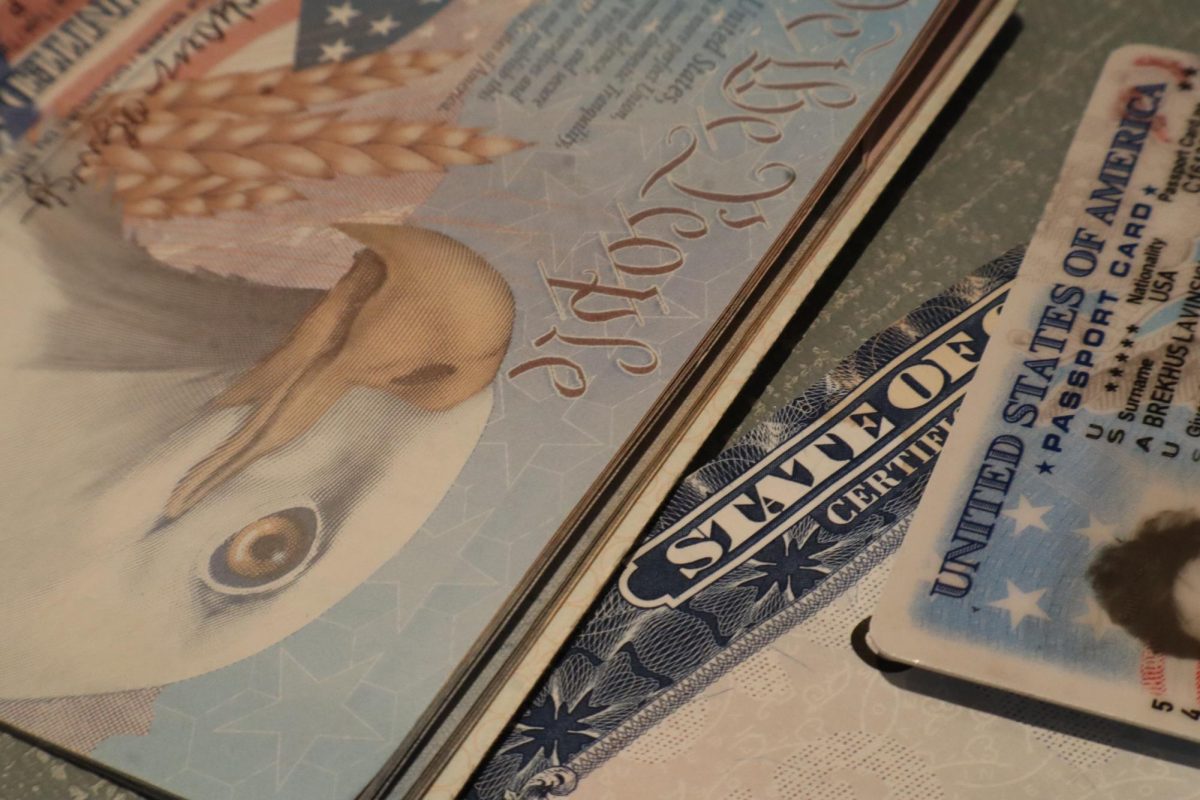Tamalpais Union High School District (TUHSD) is currently planning additional technology policies that will take effect in the fall of the 2025-2026 school year to crack down on disruptive behavior on computers during classes—a personal device ban. Rose Chavira, Senior Director of Information Technology (IT) at TUHSD, is in charge of making the proper arrangements to adjust for the changes.
“There’s a lot of student-to-student chatting going on on personal devices and that is actually one of the types of activity that they are trying to prevent by creating the cell phone policy. But then, the subset of the students in the room that have a personal device, like a laptop or tablet, are continuing that activity and it’s not exactly equitable,” Chavira said.
According to Chavira, the district is facing much more pressing issues than students simply being distracted in class. Since TUHSD’s internet provider can track all device activity on the Wi-Fi, the district has been alerted to illegal activity coming from student devices—specifically, cases of copyright infringement.

(Elle Wilson)
“We as a district are responsible for [illegal activity on campus] and could face legal action,” Chavira said.
Chavira clarified that this is not a push to ban Apple products specifically.
“We have a few different Macintosh-based labs at Redwood, the one in [room] 177 used by [the journalism classes], the one in [room] 521 used by the photography program and then there’s a graphic design lab in room 404. So, those are not going away. Those are district-provided devices that are going to remain in use in the coming school year,” Chavira said.
To prepare for the switch to school-provided devices, TUHSD’s IT department plans to replace older Chromebooks with newer, wide-screen ones. The Wi-Fi will also be updated to improve the devices’ processing speeds, which is one of the main critiques of the current school-provided devices.
“We are planning an upgrade to the wifi system so that all of the Chromebooks in the cart will operate a lot faster. The Chromebook technology has now surpassed what the wifi network can handle, so we are working on a comprehensive upgrade to the wifi network,” Chavira said.
Junior Julian Roth, a student activist who amassed over 1000 signatures on a petition against the Yondr pouch purchase, shared his insight on the IT department’s new proposal.
“[Personal devices are] so much faster. Even though there are more distractions, it makes everything more efficient. I can open up my laptop and it doesn’t take [multiple minutes] to boot up. Most students will agree you can just access everything so much more quickly. You can open more tabs without having the computer load slowly,” Roth said.
Roth regularly uses a Remarkable, a Kindle-like device with which he can write on with a pen to take notes. He wonders where the line will be drawn on what devices will be banned or allowed.
“I’m not entirely opposed to it; it just needs to be thought out,” Roth said.
As I think of the origin of our pretty permissive BYOD policy, I would say it dates back to a point in time when not every room had chromebooks, there were a lot less cybersecurity concerns. And so it has been very wide open, and back then not every student had a cellphone. Its only been in the last 5 or ten years. And so things are a little bit different now, almost every student has a smartphone with unlimited data. Also today in 2025 there are a lot more cybersecurity concerns about malware and hacking. In order to protect the district from things such as malware and copywriting infringement, it is making it easier for the district to say ‘leave your devices at home. You can live without it in the class and that sort of thing.’
There are some benefits to the teachers by ending the bring your own device policy. One is the chatting that students are doing on their personal device. The other is that all the the chromebooks in the cart can be set to
I have this tablet, and it’s like a kindle but you can draw on it. It’s called a Remarkable, and you can take notes, like my apes notes. And I wonder if something like this, where I’m physically writing with a pen, I wonder where the line will be drawn.

The whole thing with the chromebooks is that people just don’t like to use them. They take forever to boot up and if you can bring your own [devices] then you can do homework after school on your own device in the library. In class it’s so much faster to get wherever you want.
I’m not entirely opposed to it, it just needs to be thought out.
That’s definitely something that happens, when you have your text available you’re gonna be texting. Every student is going to be different, but that’s what makes it hard to regulate.
I really don’t see the purpose in an all-out ban because some of my teachers just say ‘we’re only using chromebooks for this part [of class].’
I feel like there is a lot less that could go wrong with this personal device ban then [the Yondr pouches].
It would be interesting to know what teachers think about it, because I think the response is going to vary widely. If I were to guess, I would think that some students think it’s a really good idea. Some teachers don’t care, and they see the value of having your own personal device.
It’s so much faster. Even though there are more distractions, it makes everything more efficient. I can open up my laptop and it doesn’t take [forever] to boot up. Most students will agree, you can just access everything so much more quickly. You can open more tabs without having slow loading.
QUOTES:
“It would be any student devices”
“Students would instead use the devices that are made available to them in the classrooms”
“There’s a big difference between personal devices that students bring in, that’s what we are talking about. We are not talking about discontinuing macbooks that are in the labs at Redwood.”
In short, any device provided by Redwood is going to stay.
“We have a few different Mac labs, Macintosh based labs at Redwood, the one in 177 used by Journalism, the one in 521 used by the photography program, and then there’s a graphic design lab in room 404. So those are not going away. Those are district provided devices that are going to remain in use in the coming school year.”
“There are also two windows labs, in 279 and 304. Those laptops are also going to remain in use in the coming school year.”
“So the plan to discontinue student owned devices s being discussed right now for the coming school year, and if its decided to move forward with that, then a communication will go out first to the staff, the teachers. Then there will be a follow up email sent to parents, guardians, and students, so that they are really prepared in advance for the coming fall.
“Throughout the rest of the school year, no change is going to be made.”
“There have been some issues in relation to the use of personal devices on the network that are leading us to consider this. For example, copyright infringement. We have witnessed some traffic from personal devices going to sites that provide access to computer games, media and streaming movies from pirated sites. We as a district then get contacted by the the internet service providers, such as AT&T that contact us and say we’ve noticed copyright infringement traffic originating from your school. And so we as a district are responsible for that and could face legal action, so that’s one example of why we are moving this conversation forward.”
“Not all students have the funds to have their own personal laptop, so its not really fair to everyone. Some students have to use the chromebook and are locked into paying attention, but some students have access to other things because they bring their own laptop.”
“We are working as an It department right now to upgrade legacy chromebooks that are in the cart. There are about 10-15 classrooms at redwood still that have the older smaller chromebooks. We are hoping depending upon the supply chain to wipe out all of the old chromebooks to have the newer model.”
“In addition, we are planning an upgrade to the wifi system to where all of the chromebooks in the cart are going to operate a lot faster. Sort of a bottleneck because the chromebook technology has now surpassed what the wifi network can handle, so we are working on a comprehensive upgrade to the wifi network.”
“We are working as an It department right now to upgrade legacy chromebooks that are in the cart. There are about 10-15 classrooms at redwood still that have the older smaller chromebooks. We are hoping depending upon the supply chain to wipe out all of the old chromebooks to have the newer model.”
So that’s the distinction, we’re not





![“[The Scotty Lapp Memorial Skatepark signifies that] Scotty’s energy, fun vibes and spirit will live on forever,” Jason Lapp said.](https://redwoodbark.org/wp-content/uploads/2025/03/346E3938-2C25-4CBB-9D6B-0ED4BD4A242A_1_105_c.jpeg)



